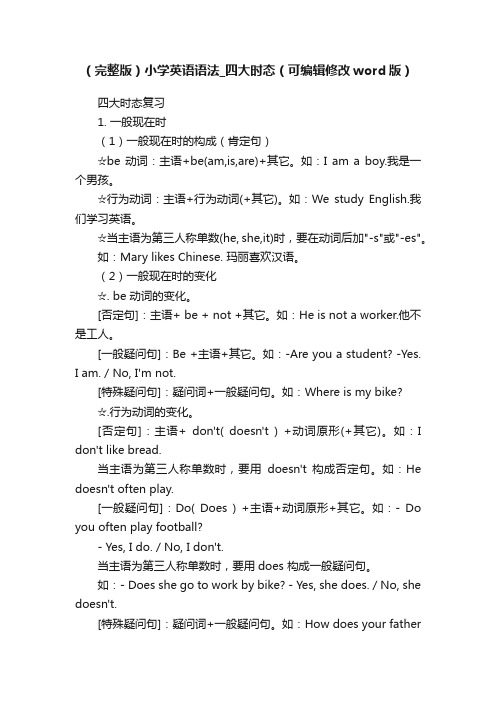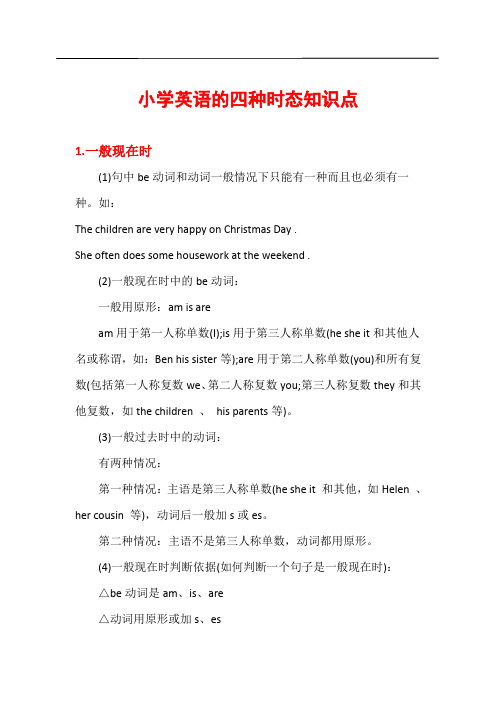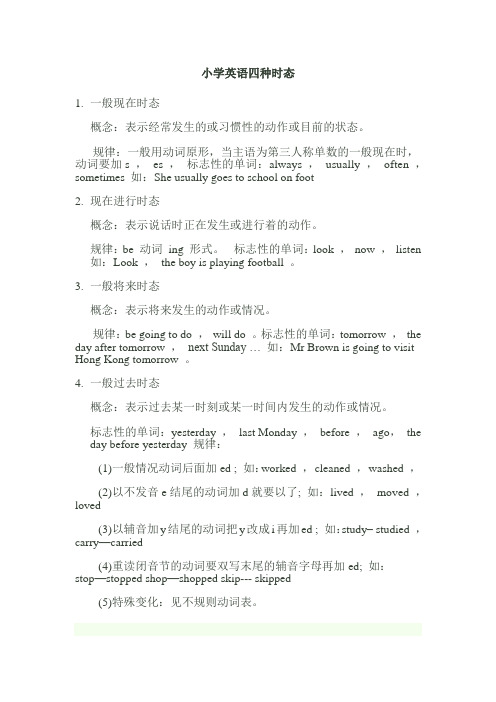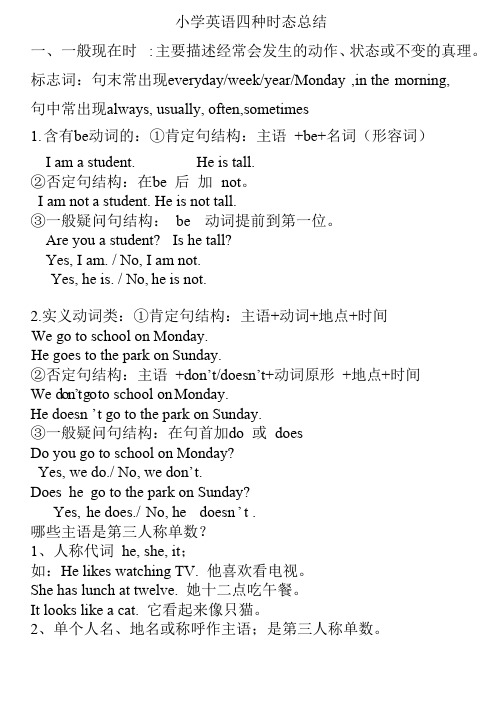小学英语4种时态总结表
小学英语4种时态总结表

一
般 过 去
表示过去时间内发生的动作 或存在的状态
时
1、 yesterday, last week/ year/ month 等
2、 two years ago/ in 2005 / at that time 等
1、 动词 be 的过去时( were)
2、 行为动词的过去式
动词过去式: Be(was, were) 动词 +ed (talked)
时 态
定义
标志词
小学英语 4 种时态复习 谓语形式
一 1、 表示当前或现阶段事物
ቤተ መጻሕፍቲ ባይዱ
般
的状态、特征。
现 2、 表示经常性、习惯性、规
在
律性的动作。
时 3、 表示客观真理、客观存
在、客观事实。
频度副词: 例: always, usually, often,
sometimes, every day(month 、 week… .)
was,
1、 was / were 放主 语前
2、 主语前加 did (动 词还原 )
1、 was/ were +
not 2、 动 词 前 加
didn ’t (动词 还原 )
What did + 主 语 + do… ? 如 : Tom did his
homework last night.
What did Tom do last night?
be 放主语前
be + not
What is / are +主语 + doing ? 如 : We’re listening
now. What are you doing now?
小学英语四种时态总结

小学英语四种时态总结英语语法中的时态是非常重要的一部分,正确使用时态可以使语言表达更加准确和清晰。
在小学英语学习阶段,学生们需要掌握四种基本的时态,它们分别是一般现在时、一般过去时、一般将来时和现在进行时。
下面将对这四种时态进行总结和归纳,希望能够帮助学生们更好地理解和掌握这些时态的用法。
一、一般现在时。
一般现在时表示的是经常性或习惯性的动作,或者是客观事实。
在句子中,一般现在时的动词形式不随主语的变化而变化,即动词用原形。
例如:1. I play football every Sunday.(我每个星期天都踢足球。
)。
2. She likes singing.(她喜欢唱歌。
)。
3. The sun rises in the east.(太阳从东方升起。
)。
二、一般过去时。
一般过去时表示的是发生在过去的动作或状态。
在句子中,一般过去时的动词形式通常是动词的过去式。
例如:1. I watched a movie last night.(昨晚我看了一部电影。
)。
2. They played basketball yesterday.(他们昨天打篮球。
)。
3. She lived in London for ten years.(她在伦敦住了十年。
)。
三、一般将来时。
一般将来时表示将来某个时间要发生的动作或状态。
在句子中,一般将来时通常使用助动词“will”或“shall”加上动词的原形。
例如:1. I will go to the park tomorrow.(我明天要去公园。
)。
2. She shall visit her grandparents next week.(她下周要去看望她的祖父母。
)。
3. We will have a party on Friday.(我们星期五要举办派对。
)。
四、现在进行时。
现在进行时表示现在正在进行的动作,或者是现阶段正在发生的动作。
在句子中,现在进行时的动词形式是“be”动词的现在分词形式。
最新小学英语4种时态总结表格

小学英语4种时态复习
员工个人廉洁从业心得体会【三篇】
当前我矿组织学习、贯彻了《国有企业领导人员廉洁从业若干规定》及《中国*员领导干部廉洁从政若干准则》的文件。
我认为:坚持煤矿廉洁文化建设的全面发展,既要随着社会和企业的发展,在内容和形式上持续创新,使之保持旺盛的生命力,又要把它作为煤矿战略的重要组成部分,全面规划,合理布局,同时,对煤矿廉洁文化建设的各个方面都要统筹兼顾,科学安排,全面推动,不能厚此薄彼,顾此失彼”。
我总结了八点体会:
一是确立核心理念。
增强xxx廉洁文化建设要树立大行业观点,要把“廉洁诚信、严于律己”确立为行业核心经营管理理念的第一要素,增强科学理论和法纪教育,增强职业道德教育,使xxx广大干部职工持续增强思想政治素质和廉政意识,老老实实做人,踏踏实实做事,清清白白做官。
二是制定行为准则。
要明确制度设计理念,围绕教育、管理、监督的各个环节,把廉洁文化工作渗透到人、财、物、事各项具体工作中去,坚持重大决策集体讨论决策,完善议事规则,构建好科学合理的预防体系,从而在xxx企业内部形成一整套科学的行为准则。
三是培养敬业精神。
建设起“刚柔相济,严爱相融”的管理制度。
人性中的一些弱点决定了人必须有相对应的制度来约束。
制度的力量在于规范性、可预见性和强制性,引导、制约人们的行为,使其按照法律、制度事先设定的标准和要求行为或不行为。
要切实增大执行监查体系建设,xxx内部各级党组织,要充分发挥纪检监察组织的组织协调作用,增强宏观指导,整合监督力量,形成监督合力,为培养xxx员工的敬业精神提供制度和监督的保证。
(完整版)小学英语语法_四大时态(可编辑修改word版)

(完整版)小学英语语法_四大时态(可编辑修改word版)四大时态复习1. 一般现在时(1)一般现在时的构成(肯定句)☆be 动词:主语+be(am,is,are)+其它。
如:I am a boy.我是一个男孩。
☆行为动词:主语+行为动词(+其它)。
如:We study English.我们学习英语。
☆当主语为第三人称单数(he, she,it)时,要在动词后加"-s"或"-es"。
如:Mary likes Chinese. 玛丽喜欢汉语。
(2)一般现在时的变化☆. be 动词的变化。
[否定句]:主语+ be + not +其它。
如:He is not a worker.他不是工人。
[一般疑问句]:Be +主语+其它。
如:-Are you a student? -Yes.I am. / No, I'm not.[特殊疑问句]:疑问词+一般疑问句。
如:Where is my bike?☆.行为动词的变化。
[否定句]:主语+ don't( doesn't ) +动词原形(+其它)。
如:I don't like bread.当主语为第三人称单数时,要用doesn't 构成否定句。
如:He doesn't often play.[一般疑问句]:Do( Does ) +主语+动词原形+其它。
如:- Do you often play football?- Yes, I do. / No, I don't.当主语为第三人称单数时,要用does 构成一般疑问句。
如:- Does she go to work by bike? - Yes, she does. / No, she doesn't.[特殊疑问句]:疑问词+一般疑问句。
如:How does your fathergo to work?*动词+s 的变化规则1.一般情况下,直接加-s,如:cook-cooks, milk-milks2.以s. x. sh. ch. o 结尾,加-es,如:guess-guesses, wash-washes, watch-watches, go-goes3.以“辅音字母+y”结尾,变y 为i, 再加-es,如:study-studies2. 现在进行时(1)一般现在时的构成:be(am,is, are)+ 动词的ing 形式。
小学英语四种时态整理

动词变化规则
Be动词口诀:我用am你用are,is连着 她他它,单数is复数are,要想学好牢 记他。变否定更容易。be后not莫忘 记,变疑问,往前提,句尾问好莫丢弃 。什么问什么答,你问我答
动词+s的变化规则(动词三单)
1.直接加s,
如:cook-cooks, milk-milks
2.以s. x. sh. ch. o结尾 ,
妖镜,后面动词现原形)
be + doing
一般疑问句:Be提前 变否定就:Be 后+not is not= isn't are not=aren't I am not =I'm not
be 动词: Be(was/were)+其他
was/were is/am-was are-were was not=wasn't were not=weren't
陈述句: We will go to Beijing tomorrow. 否定句: We won't go to Beijing tomorrow. 一般疑问句及其答语: Will you go to Beijing tomorrow ? Yes,she will../No,she won't.
be找助动词。
一般疑问句:Do 在前 非三单,动词为原形 Do+主语+动词原形+其它 ?
变否定就:动词前+don't
实义动词: 主语+实义动词(+其 它)
实义动词: 主语+实义动词(+其 它)
一般疑问句:Does在前
主语为第三人称单数 (he, she,it)时,要 在动词后加"-s"或"es"。
小学英语的四种时态知识点

小学英语的四种时态知识点1.一般现在时(1)句中be动词和动词一般情况下只能有一种而且也必须有一种。
如:The children are very happy on Christmas Day .She often does some housework at the weekend .(2)一般现在时中的be动词:一般用原形:am is aream用于第一人称单数(I);is用于第三人称单数(he she it和其他人名或称谓,如:Ben his sister等);are用于第二人称单数(you)和所有复数(包括第一人称复数we、第二人称复数you;第三人称复数they和其他复数,如the children 、his parents等)。
(3)一般过去时中的动词:有两种情况:第一种情况:主语是第三人称单数(he she it 和其他,如Helen 、her cousin 等),动词后一般加s或es。
第二种情况:主语不是第三人称单数,动词都用原形。
(4)一般现在时判断依据(如何判断一个句子是一般现在时):△be动词是am、is、are△动词用原形或加s、es△没有时间状语或有usually、often、everyday、sometimes等不是具体的时间(5)有用的的依据:Be动词是is、am ←→名词用原形(这里包括可数名词的单数和不可数名词)Be动词是are ←→名词加s或es动词加s或es ←→主语是第三人称单数动词用原形←→主语不是第三人称单数(6)情态动词:我们现在学过的情态动词有:can、must、should、would。
情态动词后动词总是用原形。
(不受其他任何条件影响)2.一般过去时(1)句中be动词和动词一般情况下只能有一种而且也必须有一种。
如:The girls were on the grass just now .They visited my parents last weekend .(2)一般过去时中的be动词:一般用过去式:was werewas用于第一人称单数(I)和第三人称单数(he she it和其他人名或称谓,如:Ben 、his sister等);were用于第二人称单数(you)和所有复数(包括第一人称复数we、第二人称复数you;第三人称复数they 和其他复数,如the children 、his parents等)。
小学英语四种时态

小学英语四种时态1.一般现在时态概念:表示经常发生的或习惯性的动作或目前的状态。
规律:一般用动词原形,当主语为第三人称单数的一般现在时,动词要加s ,es ,标志性的单词:always ,usually ,often ,sometimes 如:She usually goes to school on foot2.现在进行时态概念:表示说话时正在发生或进行着的动作。
规律:be 动词ing 形式。
标志性的单词:look ,now ,listen 如:Look ,the boy is playing football 。
3.一般将来时态概念:表示将来发生的动作或情况。
规律:be going to do ,will do 。
标志性的单词:tomorrow ,the day after tomorrow ,next Sunday … 如:Mr Brown is going to visit Hong Kong tomorrow 。
4.一般过去时态概念:表示过去某一时刻或某一时间内发生的动作或情况。
标志性的单词:yesterday ,last Monday ,before ,ago,the day before yesterday 规律:(1)一般情况动词后面加ed ; 如:worked ,cleaned ,washed ,(2)以不发音e结尾的动词加d就要以了; 如:lived ,moved ,loved(3)以辅音加y结尾的动词把y改成i再加ed ; 如:study– studied ,carry—carried(4)重读闭音节的动词要双写末尾的辅音字母再加ed; 如:stop—stopped shop—shopped skip--- skipped(5)特殊变化:见不规则动词表。
小学英语固定搭配Good night 晚安.in the morning 在早上at noon 在中午in the afternoon 在下午in the evening 在傍晚at night 在夜间have/eat breakfast 吃早饭have/eat lunch 吃午饭have/eat supper(dinner) 吃晚饭read a book 读书sing a song 唱歌have a meeting 开会have class 上课have a party 聚会have a competition 竞赛have a sleep 睡觉have a snack 吃零食have a picnic 野餐have a buffet dinner 吃自助餐draw pictures 画画listen to music 听音乐listen to the radio 听收音机learn English 学习英语learn Chinese 学习语文Learn math 学习数学tell stories 讲故事take a walk 散步ask and answer questions 问答问题fly a kite 放风筝ride a bike 骑自行车ride a horse 骑马play computer games 玩电脑游戏play games 做游戏play hide and seek 玩捉迷藏do homework 做作业watch TV 看电视take a shower 洗淋浴take a bath 洗澡open the door 开门open the window 开窗户close the door 关门close the window 关窗户paly football 踢足球/打橄榄球play basketball 打篮球play volleyball 打排球play badminton 打羽毛球play golf 打高尔夫球play bowling 打保龄球play table tennis 打乒乓球play baseball 打棒球play tennis 打网球play soccer 踢足球play hockey 打曲棍球play chess 下棋go fishing 去钓鱼go swimming 去游泳go shopping 去购物go skating 去滑冰go bike-riding/ go cycling 去骑自行车go sking 去滑雪go camping 去野营listen to the news 听新闻read the newspaper 看报read the magazine 看杂志go to school 去上学go home 回家go to the park 去公园go to the zoo 去动物园go to the library 去图书馆go to the hospital 去医院go to the cinema 去电影院go to see a film /movie去看电影get up 起床go to bed 上床go to sleep 去睡觉brush the teeth 刷牙wash the hands 洗手wash the face 洗脸wash clothes 洗衣服air the room 给房间通风make the bed 铺床sweep the floor 扫地mop the floor 拖地clean the room 打扫房间climb the trees 爬树climb the mountains 爬山cook the meals 做饭drink milk/juice/coca cola 喝牛奶/果汁/可乐play the piano 弹钢琴play the violin 拉小提琴play the drum 打鼓play the guitar 弹吉他play the xylophone 弹木琴play the flute 吹笛子play the harp 弹竖琴play the erhu 拉二胡play the zither 弹古筝play the banjo 弹班卓play the trumpet 吹小号stay at home 呆在家里at home 在家at school 在学校at church 在教堂make a cake 做蛋糕take pictures/photos 照相comb hair 梳头发have a haircut 理发go away 走开at the weekend 在周末stand up 起立sit down 坐下New year 元旦Spring Festival 春节Lantern Festival 元宵节Spring Cleaning Day 清明节Dragon Boat Festival 龙舟节International labour day 国际劳动节Trees planting day 植树节Children's day 儿童节Party's day 党的生日Army's day 建军节Teacher's day 教师节National day 国庆节Thanksgiving day 感恩节Chrismas day 圣诞节in the morning 在早上at noon 在中午in the afternoon 在下午in the evening 在傍晚at night 在夜间have/eat breakfast 吃早饭have/eat lunch 吃午饭have/eat supper(dinner) 吃晚饭read a book 读书sing a song 唱歌have a meeting 开会have class 上课have a party 聚会have a competition 竞赛have a sleep 睡觉have a snack 吃零食have a picnic 野餐have a buffet dinner 吃自助餐draw pictures 画画listen to music 听音乐listen to the radio 听收音机learn English 学习英语learn Chinese 学习语文Learn math 学习数学tell stories 讲故事take a walk 散步ask and answer questions 问答问题fly a kite 放风筝ride a bike 骑自行车ride a horse 骑马play computer games 玩电脑游戏play games 做游戏play hide and seek 玩捉迷藏do homework 做作业watch TV 看电视take a shower 洗淋浴take a bath 洗澡open the door 开门open the window 开窗户close the door 关门close the window 关窗户paly football 踢足球/打橄榄球play basketball 打篮球play volleyball 打排球play badminton 打羽毛球play golf 打高尔夫球play bowling 打保龄球play table tennis 打乒乓球play baseball 打棒球play tennis 打网球play soccer 踢足球play hockey 打曲棍球play chess 下棋go fishing 去钓鱼go swimming 去游泳go shopping 去购物go skating 去滑冰go bike-riding/ go cycling 去骑自行车go sking 去滑雪go camping 去野营listen to the news 听新闻read the newspaper 看报read the magazine 看杂志go to school 去上学go home 回家go to the park 去公园go to the zoo 去动物园go to the library 去图书馆go to the hospital 去医院go to the cinema 去电影院go to see a film /movie去看电影get up 起床go to bed 上床go to sleep 去睡觉brush the teeth 刷牙wash the hands 洗手wash the face 洗脸wash clothes 洗衣服air the room 给房间通风make the bed 铺床sweep the floor 扫地mop the floor 拖地clean the room 打扫房间climb the trees 爬树climb the mountains 爬山cook the meals 做饭drink milk/juice/coca cola 喝牛奶/果汁/可乐play the piano 弹钢琴play the violin 拉小提琴play the drum 打鼓play the guitar 弹吉他play the xylophone 弹木琴play the flute 吹笛子play the harp 弹竖琴play the erhu 拉二胡play the zither 弹古筝play the banjo 弹班卓play the trumpet 吹小号stay at home 呆在家里at home 在家at school 在学校at church 在教堂make a cake 做蛋糕take pictures/photos 照相comb hair 梳头发have a haircut 理发go away 走开at the weekend 在周末stand up 起立sit down 坐下New year 元旦Spring Festival 春节Lantern Festival 元宵节Spring Cleaning Day 清明节Dragon Boat Festival 龙舟节International labour day 国际劳动节Trees planting day 植树节Children's day 儿童节Party's day 党的生日Army's day 建军节Teacher's day 教师节National day 国庆节小学英语动词过去式agree 同意agreedask 问askedanswer 回答answeredbecome 成为becamebegin 开始beganbring 带来broughtbuy 买boughtcall 呼叫calledcarry 搬运carriedcatch 抓住caughtcheck 检查checkedclean 清洁cleanedclimb 爬climbedcome 来camecook 煮cookedcut 切cutdance 跳舞danceddo 做diddraw 画drewdrink 喝drankdrive 驾驶droveeat 吃ateenjoy 欣赏enjoyedfeel 感觉feltfly 飞fliedforget 忘记forgotfish 钓鱼fishedget 得到gotgive 给gavego 去wentgrow 成长grewhave 有hadhear 听到heardhelp 帮助helpedjump 跳jumpedkeep 保存keptknow 知道knewlearn 学习learned listen 听listenedlike 喜欢likedlook 看lookedlive 生活livedlove 喜爱lovedmake 做mademeet 遇见metmove 移动moved need 需要needed open 打开opened paint 画paintedpick 摘pickedplay 玩playedplan 计划planned practise 练习practised prefer 更喜欢preferred put 放putread 读readride 骑roderun 跑ransay 说saidsee 看sawsit 坐satskip 跳skippedspeak 说spokestart 开始startedstay 停留stayed sweep 扫sweptstudy 学习studied swim 游泳swamtalk 谈话talkedtake 带去tookteach 教taughtthank 谢谢thanked tell 告诉toldthink 想thought travel 旅游traveledtry 试trieduse 使用used wake 醒来woke walk 走路walked want 想wanted wash 洗washed watch 看watched water 浇水watered wave 挥动waved work 工作worked worry 担心worried write 写wrote小学英语可数名词复数形式1)以y结尾的专有名词,或元音字母+y 结尾的名词变复数时,直接加s变复数。
小学英语四种时态总结

小学英语四种时态总结一、一般现在时:主要描述经常会发生的动作、状态或不变的真理。
标志词:句末常出现everyday/week/year/Monday ,in the morning,句中常出现always, usually, often,sometimes1.含有be动词的:①肯定句结构:主语+be+名词(形容词)I am a student. He is tall.②否定句结构:在be 后加not。
I am not a student. He is not tall.③一般疑问句结构:be 动词提前到第一位。
Are you a student? Is he tall?Yes, I am. / No, I am not.Yes, he is. / No, he is not.2.实义动词类:①肯定句结构:主语+动词+地点+时间We go to school on Monday.He goes to the park on Sunday.②否定句结构:主语+don’t/doesn’t+动词原形+地点+时间We don’t go to school on Monday.He doesn ’t go to the park on Sunday.③一般疑问句结构:在句首加do 或doesDo you go to school on Monday?Yes, we do./ No, we don’t.Does he go to the park on Sunday?Yes, he does./ No, he doesn ’t .哪些主语是第三人称单数?1、人称代词he, she, it;如:He likes watching TV. 他喜欢看电视。
She has lunch at twelve. 她十二点吃午餐。
It looks like a cat. 它看起来像只猫。
2、单个人名、地名或称呼作主语;是第三人称单数。
- 1、下载文档前请自行甄别文档内容的完整性,平台不提供额外的编辑、内容补充、找答案等附加服务。
- 2、"仅部分预览"的文档,不可在线预览部分如存在完整性等问题,可反馈申请退款(可完整预览的文档不适用该条件!)。
- 3、如文档侵犯您的权益,请联系客服反馈,我们会尽快为您处理(人工客服工作时间:9:00-18:30)。
动词过去式:
Be(was, were)
动词+ed(talked)
不规则的动词过去式(went、came、saw等)
1、动词be的过去时(was, were)
2、行为动词的过去式
1、was / were放主语前
2、主语前加did (动词还原)
1、was/ were + not
2、动词前加didn’t (动词还原)
What did +主语+ do…?
如:Tom did his homework last night.
What does she do every day?
主语三人称单数
主语+动词三单形式
She goes…
主语非三单
主语+动词原形
Igo…
现在进行时
1、表示说话的此时此刻正在进行的动作或存在的状态。
2、表示即将到来或很快发生的事,常有“意图”“安排”或“打算”的含义,这样给人一种期待感。
1、提示语:
look!Listen!Now;be quiet!
小学英语4种时态复习
时态
定义
标志词
谓语形式
疑问形式
否定式
提问谓语
一般现在时
1、表示当前或现阶段事物的状态、特征。
2、表示经常性、习惯性、规律性的动作。
3、表示客观真理、客观存在、客观事实。
频度副词:
例:always, usually, often,
sometimes, every day(month、week….)
What will he do next week?
be going to+动词原形
will+动词原形
一般过去时
表示过去时间内发生的动作或存在的状态
1、yesterday, last week/ year/ month等
2、two years ago/ in 2005 / at that time等
2、will + V原形
3、go, come, leave等用现在进行时表示将来
4、want用现在时表将来
be或will放主语前
be或will后加not
will not = won’t
1、What is/ are +…going to do…?
2、What will +主语+do…?
如:He will play basketball next week.
1、系动词be ( am, is, are)
行为动词原形(主语为第三人称单数时V + s,或es)
1、be放主语前
2、主语前加do或doБайду номын сангаасs (动词还原)
1、be + not
2、动词前加don’t或doesn’t (动词还原)
What do /does +主语+ do…?
如:Shereads Englishevery day.
2、将要发生的动作或存在的状态
3、表示打算、计划或意图要做的动作或事件。
1、tomorrow, the next day, this afternoon, this evening
2、next week (month, year…)
3、in the year 2007
1、be going to + V原形
2、At +时间点
Be (am, is, are ) + V-ing
be放主语前
be + not
What is / are +主语+ doing?
如:We’re listening now.
What are you doing now?
be动词+现在分词
(be+动词ing)
一般将来时
1、表示讲话或打算做某事
